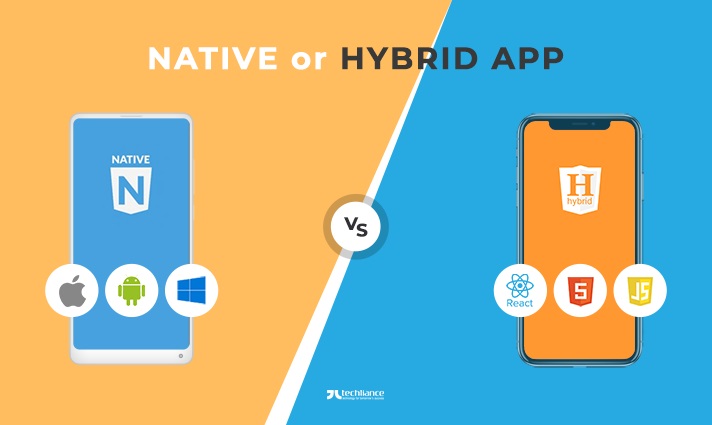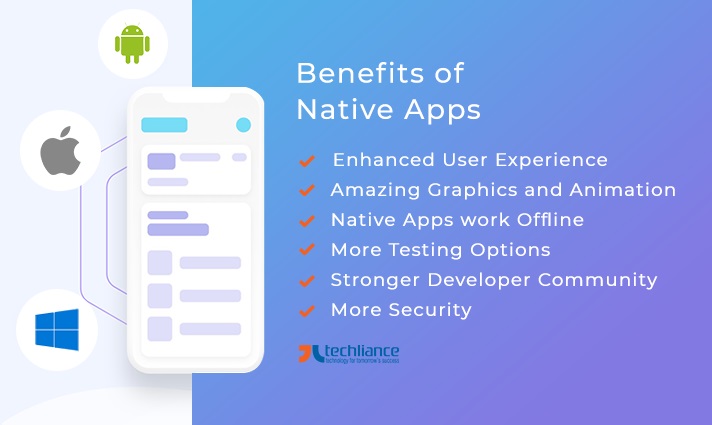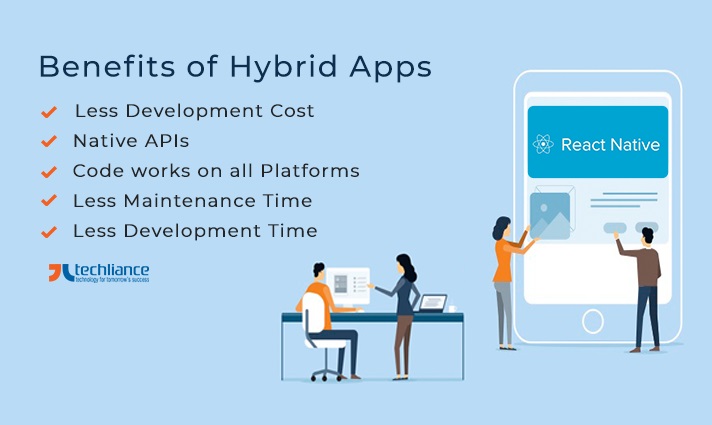Deciding on building an app is an exciting feeling. Not only are you going to start a venture but it’s going to be a road full of decisions regarding the route you’d take for your Mobile Application Development process. As a starting point, decision time is right away when you have to choose whether you want a native or a hybrid app.
Main Difference between Native Apps and Hybrid Apps
Native apps are specifically built for iOS, Android and Windows platforms respectively while a hybrid app is built for all platforms. A native app would be written in the operating system’s particular programming language. You’d probably be asked to install the version of app on basis of your OS which is a big giveaway on whether an app is either a native or a hybrid. For the latter, this question is usually not there for example, YouTube, Twitter, Uber, Instagram – these are hybrid apps.
A hybrid app or cross-platform app is basically a website packaged in a native container. So it feels like a unique app but what you are in fact accessing is a website through Webview, a mini-browser. If you are considering hybrid app development then make sure your app is primarily content-focused.

On the outer surface, both kind of apps look and act pretty much the same as they can be easily downloaded and installed on your mobile device. A hybrid app is built with HTML5, JavaScript and CSS while native apps use Java for Android and Swift or Objective-C for iOS platforms. Figuring out what route is better for your Mobile App Development objective? Read on to find which option is better for you.
Advantages of Native Apps
It is true that hybrid apps are gaining momentum. But for now native apps are dominating the app development market. These factors are the reason behind the Native applications’ dominance.
- Enhanced User Experience
- Amazing Graphics and Animation
- Native Apps work Offline
- More Testing Options
- More Security
- Stronger Developer Community

Let’s discuss the plus points of Native apps in detail.
Enhanced User Experience
Native apps offer a superior user experience which explains the reason most of game apps are built on them. Native app development trends continue in the market because these apps are fast, intuitive and fluid so that users have better interaction with them. These apps are also highly responsive with a wide range of features.
Amazing Graphics and Animation
As stated above, most of native apps have a very impact-full user experience with dynamic graphics and smoother transition of animation. This is why majority of game and video editing apps are native in nature.
Native Apps work Offline
Native apps store content and images on the mobile device so users don’t need to have access to the internet to use the app. The offline feature mode is only available to native apps where limited to no access to internet does not restrict the usage of the app.
More Testing Options
As the concept of native app development has been there for a while; the testing and debugging tools are more for native apps. So the overall testing for a native app takes lesser time in comparison.
More Security
Because of easy implementation of two-factor authentication, certificate pinning and access to built-in security features like Touch ID; native apps are more secure than hybrid apps.
Stronger Developer Community
You will find more documentation and support for native apps online than for hybrid apps. This iterates the fact that native applications are in more demand than the hybrid applications.
Disadvantages of Native Apps
Every thing has benefits and risks associated with it. Native apps are no different in this regard. Following are the drawbacks of Native apps.
- More Development Cost
- More Turnaround Time
- Expert Level of Developers Required
- More Maintenance Budget
Let us consider the negative aspects of Native apps in details.
More Development Cost
Native apps are built separately for both platforms, meaning higher development and deployment costs.
More Turnaround Time
The turnaround time for a native app is usually 4-6 months or even more if you face any other blockages along the way.
Expert Level of Developers Required
Native apps are built using technical languages which means you need expert level of resources to do the job. The team will be a bigger pool as you need to develop the app for both platforms.
More Maintenance Budget
As you will be managing two separate code-base, the maintenance costs will be more.
Advantages of Hybrid Apps
Hybrid apps have some salient features, which are boosting their usage. Following are the rewards of hybrid or cross-platform applications.
- Less Development Cost
- Less Development Time
- Code works on all Platforms
- Native APIs
- Less Maintenance Time

Let us elaborate benefits of Hybrid apps in detail.
Less Development Cost
In comparison to native apps, a hybrid app costs a lot cheaper. Let’s face it; you don’t have to create 2-3 versions of your app to run on iOS, Andriod, and Windows platforms. So it’s like “One Ring to Rule Them All” kind of policy (a good allegory for Lord of the Rings fans).
Less Development Time
Once again hybrid apps take a lot lesser time to build which means the overall deployment time is also less. As long as you’re not aiming to build a lot of custom features; otherwise hybrid app development time will be more than developing a native app.
Code works on all Platforms
Hybrid apps take away the hassle of handling two project life cycles i.e. developing two apps for Android and iOS platforms.
Native APIs
The biggest advantage of going for hybrid app development is the wide range of plugins that you can use in your app. These include gestures, camera and contacts to name a few. This is the reason some of the popular apps such as Twitter, YouTube have a very native feel to them.
Less Maintenance Time
Similarly, the maintenance and updating time for hybrid app is lesser than the native app.
Disadvantages of Hybrid Apps
There are some shortfalls of hybrid apps also, which are as under.
- No Connection Literally Means No App
- Some Features Aren’t Supported
- APIs can’t always get you a win
- User Experience is Compromised
Let’s divulge in details of negative aspects of hybrid apps.
No Connection Literally Means No App
The biggest disadvantage of a hybrid app is that they don’t work offline. As they are websites, without internet they cannot function and be of any use. They also tend to be slower as each element/feature has to be downloaded to function properly. That’s why you have to pick and choose which features you want in your app, which brings us to the next point.
Some Features Aren’t Supported
Hybrid app is developed using one code-base. However, there is a strong possibility of certain features or designs that may not be supported on both platforms. This means you have to code separately for such features, implying additional costs and time for your hybrid app development.
APIs can’t always get you a win
Although using native APIs should be an advantage but the downside of using third-party plugins is that they may not always be available or be reliable. They can even get outdated with time. You might be pushed into writing your own API sometimes. This is counterproductive in your decision of going for a hybrid app.
User Experience is Compromised
The primary factor in mobile app development is to consider the overall look and feel for the users. With hybrid apps, this aspect is sidelined because they are reliant on plug-ins and components that may not go well with the overall user experience.
What to Select from Native Apps vs Hybrid Apps?
With less time and limited resources, it’s always best to go for a hybrid app. Hybrid app development is also prudent choice if you are going to build a minimum viable product for a smaller market. Once your app becomes popular, you can always go ahead with a native version for your app.
Native apps are recommended for a company that has higher availability of resources, time and cost at their hands. If you have the freedom to develop an app with a lot of functionality, then native app development should be your first and only choice.
Nowadays, there is also a midway between native and hybrid apps; React Native. This platform has been developed by Facebook and is now extensively used by Facebook and many others as well. React Native is growing popular in development community day by day. React Native is changing cross-platform development scene worldwide.
Whichever option you decide on, your app development can be fully catered by Techliance. This distinguished Customized Information Technology Services Company has a proven track record of providing end-to-end app development solutions to businesses all over the world. Working in a dedicated manner, its team of fully qualified developers has complete expertise and know-how on all technologies and development platforms. It can help you create a successful mobile app ensuring quality with less turnaround time and cost. Give us a call at +1 8013088750 today and email us at [email protected] for a discussion or a free quote.




